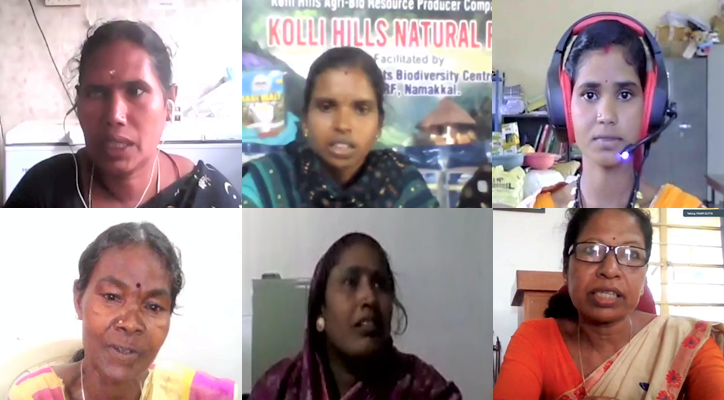Six women from various rural backgrounds spoke fervently from personal experiences of agricultural and fishing practices that withstand disruptions ensuring a sufficient availability and access to diverse foods. They also shared challenges faced and opportunities they took to make their dreams possible.
Ms Champa Santa from Koraput District had received trainings from MSSRF on types of foods and their nutritious value. She came to know the vitamins and minerals in fruits and vegetables, and understood the importance of growing them in her garden. “We used to eat very small qualities of vegetables and almost no fruits because they are too costly for us, but now my family and I get to have more quantity and also a variety as the crops grow in our backyard.” She made her duty to pass this knowledge on her neighbours, the SHG women members, and in the village, and spread the importance of nutrition gardens in every house.
From Kolli Hills is Ms Vennila – a farmer, and the Director of Kolli Hills AgroBioresource Producer Company Ltd. She relayed about the shift in diet habits among community members from millets to tubers and attributed this change to the production problems related to millets. “Now we have a thresher and pulveriser, and other small machinery to manage processing issues, and through the FPC we generate good profits for all members.” She adds that her community has returned to eating more millets rather than Cassava, and credits the FPC for the declining migration of agricultural labour is her village.
Ms Uthra Sakthivel is a Irular tribal fisherwomen from Pitchavaram region, and leads a MSSRF livelihood group under one of the Fish for All Centre’s projects. Uthra and her family have been involved in crab fattening since 2007, and exposure to MSSRF techniques of carb fattening brought her much more income. “While most of my earnings go towards education expenses, I am now economically independent and am able to buy my children anything they ask for.” It is more than earning a livelihood for Uthra – she is passionate about protecting the coastal environment and marine species, especially the crabs with eggs, and has instilled the same behaviour among other families in the village. “I do this not only to protect nature, but also to secure our livelihood, and now everyone in our community understands the value of releasing the crabs carrying eggs back inot the sea.”

From Titabar is progressive farmer Ms Sikha Moni Buragohain. She is a member of the KuhiPaat FPC that is making good profits ever since they expanded to producing rice apart from handlooms and textiles. “The trainings and advisories via voice messages encouraged us to market our produce more effectively.” As a result, the FPC members earn up to Rs 2,000 per quintal and also have enough funds to hire agricultural equipment as subsided rates for quicker agricultural turnaround.
Ms Sandhya Rani Nayak from Gamjam district in Odisha spoke about the trainings from MSSRF influenced farming practices and this brought not just better yield but also better quality because of the organic fertilizers. “Our income has improved, and we have started to eat vegetables and fruits that we grow; I have noticed that my family enjoys better health because of these changes.”
Last but not least was Ms Ammini Madamkunnu from the Paniya tribal community in Wayanad and is the leader of the Paniya Women’s Collective Farming Group. Despite not owning land of her own, she has been cultivating vegetables and tubers for decades on available land, and has conserved ten varieties of tubers, six varieties of cucurbits, five varieties of vegetables and legumes. Her efforts had ensured enough food and nutrition particularly during the COVID outbreak.
What all these women have in common…
Apart from them taking advantage of training opportunities offered by MSSRF, all the women are from economically and socially backward communities struggling to survive. They are all now economical independent, feel empowered, and have dreams for a better future for their families and business. Although every one of them claim to have spouse and family support, they also admit that they are probably exceptions. “The men have always dominated us, and perhaps in our families, customs are changing for the better, but it not the same for other women in our communities.” Decision-making, particularly when it comes to spending money lies with the male members, they agree, but they do enjoy certain liberties because they are also breadwinners. These women have used the knowledge received to explore business opportunity and become rural entrepreneurs.

